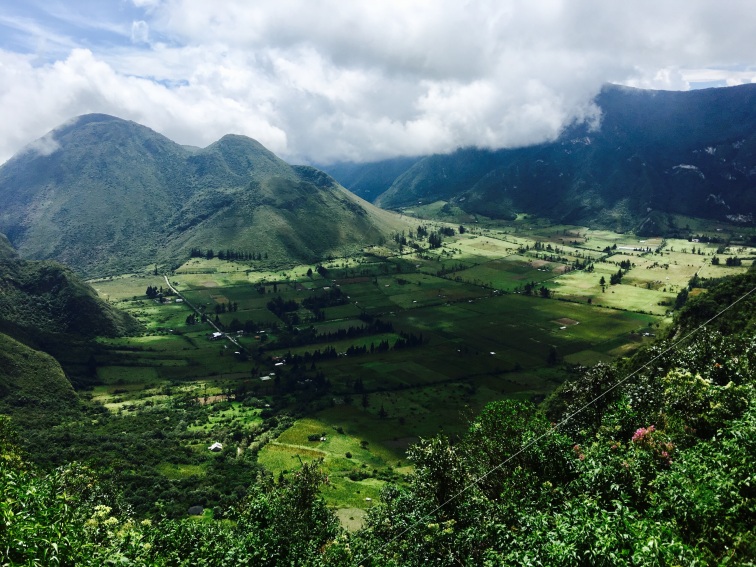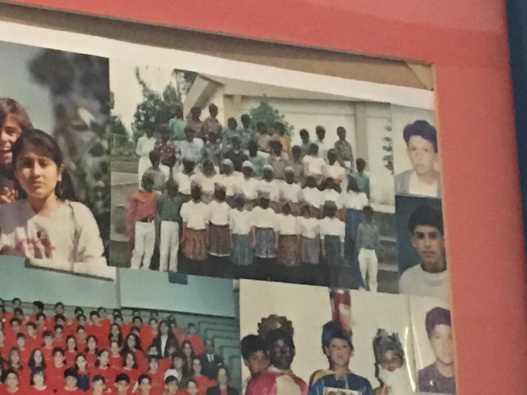I didn’t know what to expect prior to landing in Quito. I had no idea what visiting this country would be like beyond the view of mountains and volcanoes along with the smells and tastes of fresh fruit and Latin flavors that I read about after doing some #Googles. If it wasn’t for the itinerary, you could just about say I was going into this blind. I am, however, well aware of what compelled me to participate in this study in the first place.

My Ecuador Trip is a program that was designed by my faculty advisor when he was completing his graduate studies. It is an educational and cultural tour of Quito, Ecuador and surrounding cities that came to be after noticing not many people traveled to the country from the United States, and that there was really not a lot of information in higher education research or educational research overall pertaining to Ecuador. What made this study abroad program different from the Germany study abroad program (and arguably many of the study abroad programs across the nation) was my faculty advisor actually being from the country and growing up there until moving to the United States to attend college. This dynamic provided a more unique and truly authentic experience into understanding and learning about Ecuadorian culture from the locations of accommodations to the food that we were able to try to the political history of the country.
After adjusting to the continuously changing sea level depending on where we traveled (I’m from Michigan, we are pretty flat), it was easy to take in the beauty and richness of this country. You could see the care and concern shown for others in the community and the also the priority placed on the family’s overall well-being. It is not uncommon to see young children work to earn money for the family. Further, there is deeply rooted appreciation for the land that people occupy that sustains them in so many ways.

Just like any other country in the world, Ecuador is not free of issues that impact higher education and in larger scale society as a whole. Corruption in the government, lack of access to certain careers, K-12 schools, and institutions of higher learning due to anti-black racism, the determination of the value of an education, higher education being a public or private good, serving the needs of the community – all of these things exist here as well. Further, similar to Germany where higher education is free of all tuition and fees for students, Ecuadorian higher education became completely free of all tuition for students under the 2008 constitution. Prior to this, there were no tuition costs to students but they were responsible for the covering any associated fees with completing their studies – which could vary depending on course of study. A major critique that I have of this now that I have seen it done in two different places surrounds who actually benefits from this resource. It can easily be seen that those who benefit the most from free higher education are those who could easily afford to pay for it anyway. It is difficult to find a student from a low-income family benefitting from this as there are factors (i.e. recruitment, family name, political affiliation, donations, access, additional expenses, to name a few) that continue to keep higher learning out of reach for some and not for others. When thinking about this in US context, students pay (A LOT!) to go to college and it still mostly benefits the rich even though everyone is required to pay whether you can afford it or not. It’s evident that neither systems work and we have to be innovative in not only our thinking but also our development of higher education options to students.
Many of the cultural visits provided additional context around the way society has shaped and how they view higher education. It is seen as a benefit for some but for many the trade off does not seem to be worth it if more time can be dedicated to earning money for the family. Time spent attending college is time taken away from a families overall income, and this applies as soon as a student is old enough to not be required to attend school. There have been efforts to expand higher education offerings, especially in the area of science, technology, engineering, and math. This area has slowly seen increases in enrollment, however, further development is needed along with leadership, staff, finances, and addressing access to all expressing interest no matter circumstances.

Overall, I really enjoyed this trip. Not only because of the beautiful places I got to see, the food I was able to try, or because of the photos I was able to take. I enjoyed this trip because I was challenged mentally, physically, and emotionally from start to finish. I was forced to think about things in new ways being in a country that is still developing. It made me think about how we critique just about everything at first glance without having all of the information. I climbed, hiked, rode horses, and walked for long periods of time up and down hills to experience what it’s like to live in Quito on an average day. Lastly, I spent a lot of time thinking about the ways that colorism and anti-black racism shows up in communities around the globe. The more I am lucky enough to travel, the more one thing remains crystal clear and consistent – people know ‘black’ and they know that black is wrong. It’s also critical to note that anti-blackness doesn’t always show up in blatant ways. Sometimes it shows up masked as gratitude, appreciation, or even extra attention to details in the ways that people interact with you. Unfortunately, this was part of my experience in Ecuador as well, but is not something I am unfamiliar with. Anti-black racism persists in many of the spaces I enter in the US. So, couple this experience with being in a unfamiliar space and there is an extra added element of fear, rage, and frustration because you don’t know what your reaction could cost you. You also are unfamiliar with the ways that those around you think about and unpack racism…if they even notice.

Students pictured in black face for the elementary school’s cultural appreciation week according to the school principal.
You can find many of the photos from this trip on the Instagram page. Also, the complete itinerary for this trip has been uploaded to the website if you are interested in searching (and hopefully checking out at some point) any of the academic, cultural, and touristic visits. I have linked the website for the study tour above and encourage you to look into attending if you are able.
It was an incredible experience and I’m glad I was about to participate.
